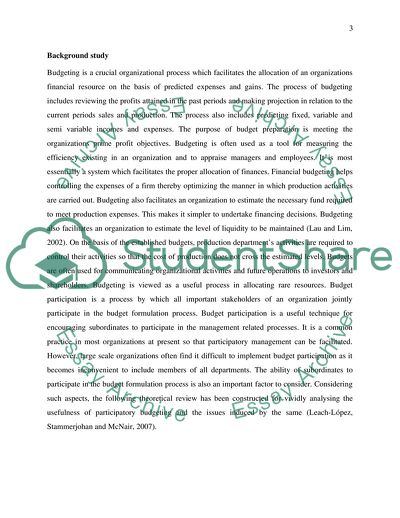Cite this document
(Participation in the budget setting process may create as many Essay, n.d.)
Participation in the budget setting process may create as many Essay. https://studentshare.org/finance-accounting/1846392-participation-in-the-budget-setting-process-may-create-as-many-problems-as-it-solves-although-it-may-help-secure-better-managerial-commitment-to-budgetary-targets-it-also-offers-opportunities-for-the-creation-of-budgetary-slack
Participation in the budget setting process may create as many Essay. https://studentshare.org/finance-accounting/1846392-participation-in-the-budget-setting-process-may-create-as-many-problems-as-it-solves-although-it-may-help-secure-better-managerial-commitment-to-budgetary-targets-it-also-offers-opportunities-for-the-creation-of-budgetary-slack
(Participation in the Budget Setting Process May Create As Many Essay)
Participation in the Budget Setting Process May Create As Many Essay. https://studentshare.org/finance-accounting/1846392-participation-in-the-budget-setting-process-may-create-as-many-problems-as-it-solves-although-it-may-help-secure-better-managerial-commitment-to-budgetary-targets-it-also-offers-opportunities-for-the-creation-of-budgetary-slack.
Participation in the Budget Setting Process May Create As Many Essay. https://studentshare.org/finance-accounting/1846392-participation-in-the-budget-setting-process-may-create-as-many-problems-as-it-solves-although-it-may-help-secure-better-managerial-commitment-to-budgetary-targets-it-also-offers-opportunities-for-the-creation-of-budgetary-slack.
“Participation in the Budget Setting Process May Create As Many Essay”. https://studentshare.org/finance-accounting/1846392-participation-in-the-budget-setting-process-may-create-as-many-problems-as-it-solves-although-it-may-help-secure-better-managerial-commitment-to-budgetary-targets-it-also-offers-opportunities-for-the-creation-of-budgetary-slack.


